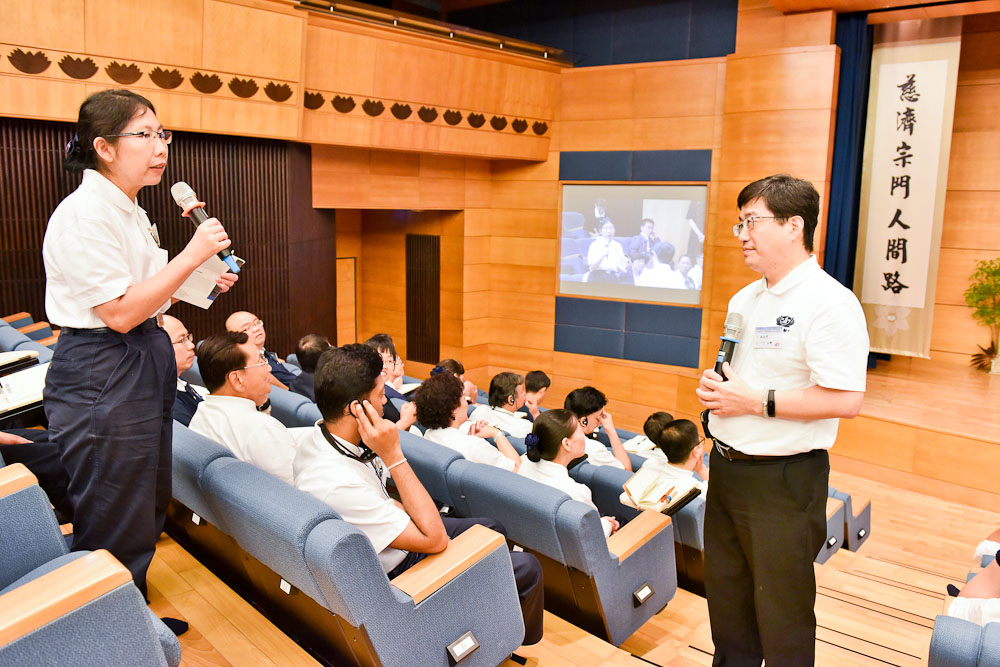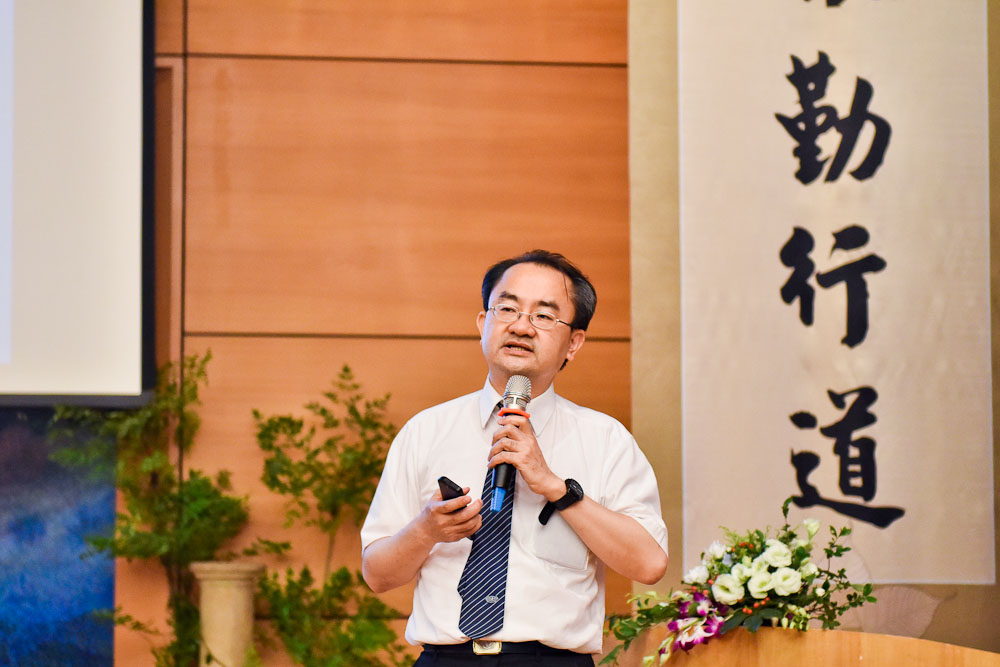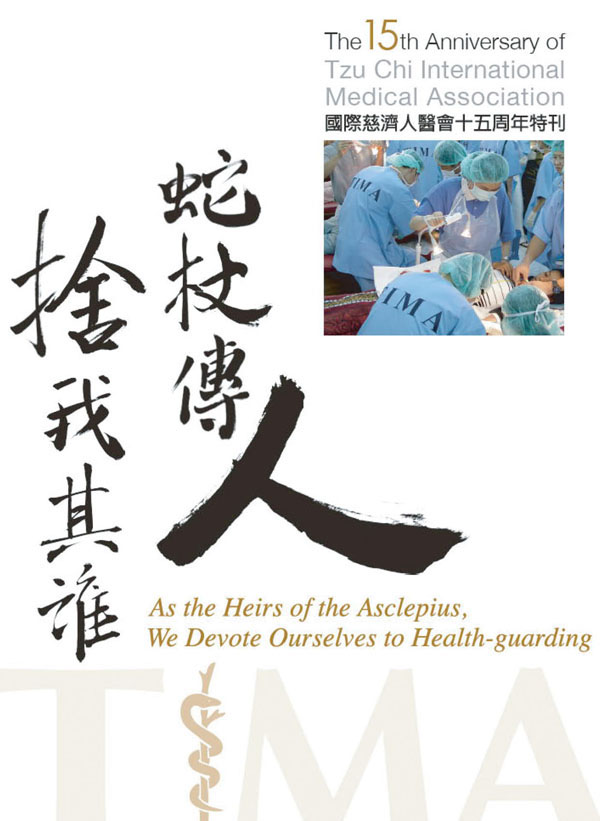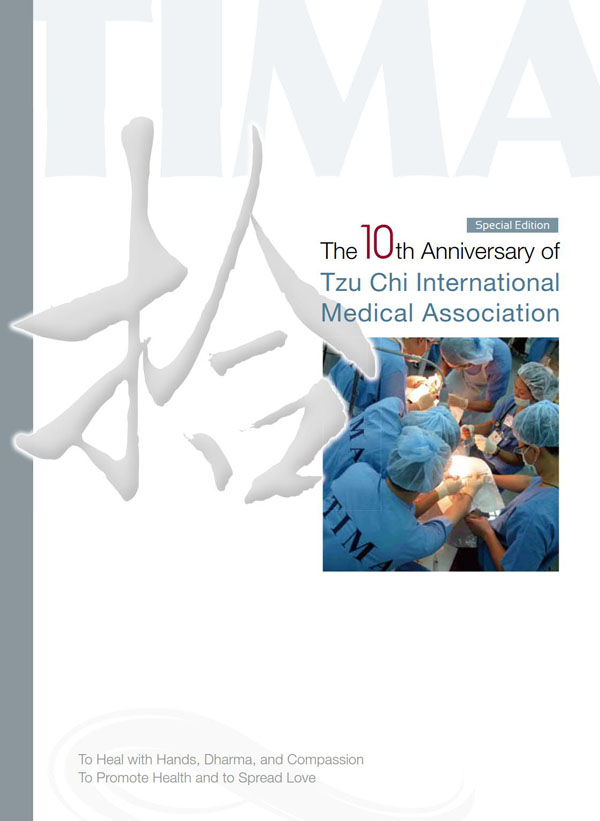
Written by: Huang Chang Bin
Translated by: Margaret Lee
Up to 150 TIMA members gathered in the International Conference Room of Hualien Jing Si Hall to listen to the talks of the Vice-Superintendent of Dalin Tzu Chi Hospital, Dr. Lin Ming-nan and the Director of cardiology department of Dalin Tzu Chi Hospital as well as the Secretary General to the Superintendent, Dr. Ting-guang Lin. With the help of the simultaneous interpreter, the TIMA members from various countries were able to get the information of the medical research papers delivered by the speakers.
Before the conference started, Team leaders thoughtfully reminded the attendees to switch the channel to whichever mother language they needed on their receivers and also tested whether their machine was functional. When few members raised their hands up to seek help, the staff quickly came forth to help them solve their problems. When all was ready, members welcomed their first speak, Dr. Ming-nan Lin with enthusiasm.
The speech title for the day was “Holistic View of Health”, which was projected on the big wide screen. Dr. Lin delivered a good humorous speech by introducing Dalin Tzu Chi Hospital’s beautiful surroundings through a short video clip. The green, wavy rice paddies with butterflies flying here and there, which gave a sense of idyllic touch to its views as well as depicted the history of “the hospital in the mid of rice paddies”. It was indeed truly warming.
Environment is important
“Environment plays a key role to people’s health.” Dharma Master Cheng Yen said that by coming together to offer our help to people in need, we can create wholesome collective karma around us. Dr. Lin directly presented his theme. He said that last year, Tzu chi brought relief to quake-hit Nepal and its volunteers offered immediate help to people in need and accompanied them to go through a difficult time. This great love in action might have helped the locals in Nepal a little, but the most significance for the Tzu Chi volunteers was that they had gained far more by just giving of themselves. Also, when the quake-affected Nepali people saw Tzu Chi volunteers bringing aid from afar, the seed of compassion also embedded in their hearts. Nepali Children who have experienced and touched by this will be able to offer their compassion to others when they grow up.
On his PPT, he presented that because Southern Taiwan has been threatened by Dengue Fever recently, mosquito nets have been hung in the corner of the emergency room of some hospitals. It might give people the wrong impression that they stepped into an army camp rather than a hospital. He then quickly switched his topic to discuss about the interrelationship between the environment and the body of each individual. He pointed out that the Four Elements of earth, water, fire, and wind together can cause impacts to the change of the environment, and our physical bodies inevitably go through the stages of birth, aging, illness and death in life. Food, emotions, and social interaction with others are also closely linked to people’s health.
Our mindset determines how we perceive the world
According to the empirical research, how we see the world around us is influenced by our mindset. Dr. Lin said that in 1979, Reminiscence Therapy helped improve the care of patients with Dementia, it made people aware that it is helpful to live in the countryside as their body ages. Each person has a different perspective on things. How we define pressure? How we deal with pressure? The answer to each question raised here depends on who we are and how we perceive pressure and cope with it. Pressure can be either positive or negative. By helping the attendees do a brainstorm, Dr. Lin started a sentence beginning with “And your boss is…” to make them aware of their way of thinking. “Is my boss a good boss or a bad one?” “Does he resemble helpfulness or pressure to me?” Pressure can be seen as strength too, it all depends on our mindset.
Dr. Lin further pointed out that between 1967 and 2000, the ratio of research papers on psychology from the positive angle vs. the negative angle was 1 to 20. This meant that the researches were focused far too much on negative facts. He then stressed that we should not undermine “the power of our faith”; where there is a will there’s a way. He encouraged the TIMA members to serve themselves selflessly with Tzu Chi and do recycling work. Wholesome thoughts can generate positive power to inspire people to join. By showing a photo taken 40 years ago, in which Dharma Master Cheng Yen took a photo shot of a group of senior Tzu Chi brothers and sisters who together helped pushing the bus they took whose tires got trapped in a poor of muddy water on their way to Pingtung to visit care recipients.
“Feeling Hurtful” or “Hurting our Heart”
The next talk delivered by Dr. Ting-guang Lin is to discuss the subtle relationship between our body and mind from the viewpoints of psychology and physiology. Our feelings can deeply influence our body from all aspects. From the title of “Feeling hurtful” or “Hurting our heart”, the attendees could tell the message the speaker tried to convey; how mental health problems affect patients with cardiovascular disease.
Having researched in psychology for over a decade, Dr. Lee Ting-guang started with the fatal cardiovascular disease. He pointed out that heart disease is the leading cause of death in the world instead of cancer, which mistaken perceived by some TIMA members. He said candidly that people could die from heart disease if there was no automated external defibrillator available to help rescue them. It may take people with heart disease 20 or 30 years to develop the symptoms of myocardial infarction. 50 percent of patients with heart disease do not have any prehistoric symptom prior to their first heart attack. He said that there exists close links between psychological conditions to our heart. Emotions can trigger heart disease. However, many physicians including cardiologists have overlooked this important link: getting angry or becoming depressed can trigger heart disease.
“Rewriting our sub-consciousness is a crucial thing we must do. How do we start? The best way is to calm ourselves and allow our consciousness to take control of our body. Our sub-consciousness can control our several behaviors simultaneously, but our consciousness can only control one job at a time.”Dr. Lin further said that through ways of doing abdominal breathing, taking regular exercises, participating in social activities, or volunteering with charity work, people can calm themselves and allow the consciousness to take control of their body so that they can become familiar with the environment around them first, and then further change their habitual thinking and behaviors in order to transform their personality.


